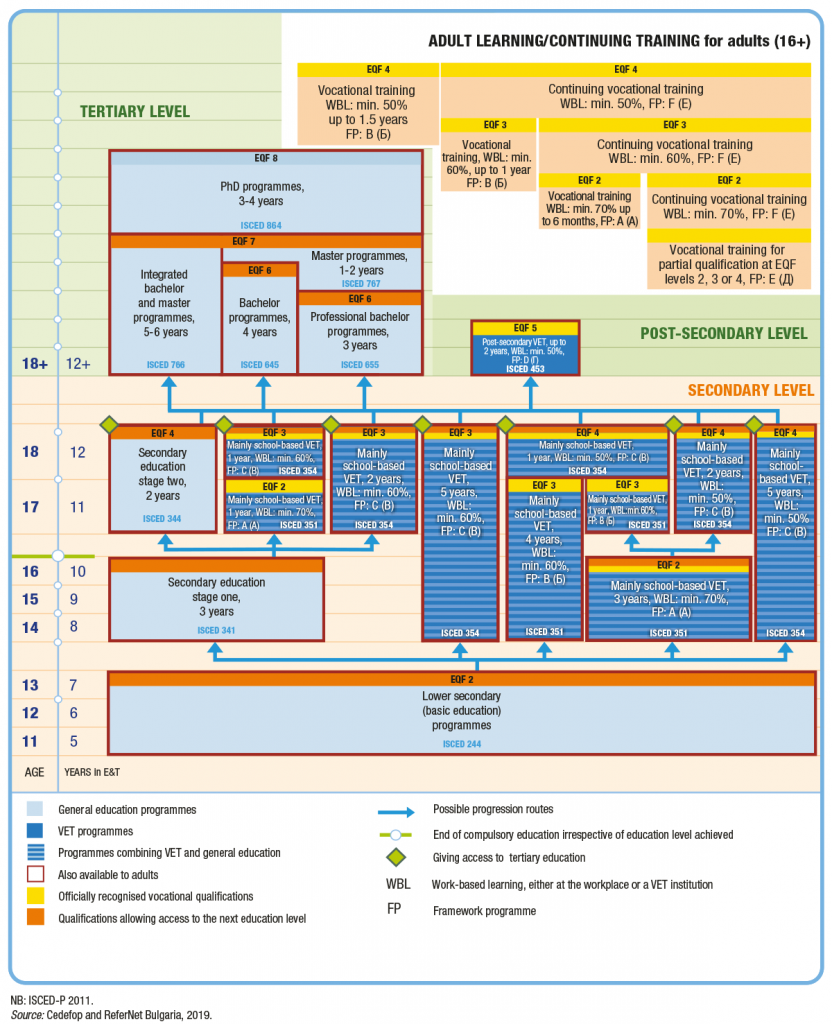About Cedefop
Cedefop (Eurorean Centre for the Development of Vocational Training) is one of the EU’s decentralised agencies. Founded in 1975 and based in Greece since 1995, Cedefop supports the promotion, development and implementation of the Union policy in the field of vocational education and training (VET) as well as skills and qualifications policies by working together with the Commission, Member States and social partners.
To this end, it enhances and disseminates knowledge, provides evidence and services for policy-making, including research-based conclusions, and Cedefop’s mission reflects its evolution as an organisation and the expanding portfolio of activities. Since its foundation in 1975, Cedefop’s expertise has deepened and widened as cooperation on VET policy, skills and qualifications between the European Commission, Member States and social partners has become stronger and more sophisticated. To set the stage for future strategic priorities, insight into the development of VET and Cedefop’s role and contribution is a prerequisite.
The launch of systematic European VET cooperation in 2002 (the so-
called Copenhagen process) has led to agreement on common policy objectives supported by indicators and regular monitoring. A set of European tools supporting mobility of learners, quality of VET programmes and the understanding of qualifications have been implemented. Countries have worked on common priorities to make VET more relevant and attractive to people and employers. Overall, European cooperation has raised VET’s profile, enabling it to support the transformations in the economy and society, including the digital and green transitions.
Cedefop’s contribution to these developments has been substantial. It has proposed and directly supported development and implementation of key European tools. Its expertise helped shape the European qualifications framework (EQF) and supported the national frameworks (NQFs) linked to it, making it easier to compare qualifications from different countries. Supporting the move to basing curricula and qualifications on learning outcomes, Cedefop has helped open new ways of validating non-formal and informal learning and new pathways to qualifications. Its policy reporting has monitored, reviewed and advised on implementing European VET policy priorities, helping shape policy
direction.
Cedefop’s analyses and research have improved understanding of the strengths and weaknesses of VET systems and provided insights into VET’s social, economic and personal benefits. With its evidence base and analyses, Cedefop has supported countries’ and social partners’ efforts to expand work-based learning, including quality and effective apprenticeships. Drawing on its analytical capacity and its expertise in lifelong guidance, validation of skills and VET financing, Cedefop has backed their endeavour to devise upskilling strategies for people with low skills and implementing the social rights pillar.
Aiming to help inform VET policy and provision and, more broadly, people’s education and career choices, Cedefop has developed EU-wide approaches to understanding current and anticipating future skills demand and supply. This work on labour market and skills intelligence and relationships between jobs, skills and qualifications, allows improving VET governance and modernising VET proactively, in the pursuit of building and maintaining employability for learners and workers, and competitiveness for businesses. It has helped raise the profile of VET beyond education and training and employment policies, not least through its work on green skills and its activities dedicated to digitalisation, artificial intelligence and the future of work.
Read more about Cedefop Who we are | CEDEFOP

About ReferNet
Refernet is Cedefop’s European network of expertise on VET. It was set up in 2002 to meet the growing demand for comparative information about VET systems, developments and policies at the time. The network currently covers EU member states, Iceland and Norway. Each country is represented by a key organisation involved in VET and/or VET-related research and analysis referred to as the national ReferNet partner.
Since 2013, the coordinating institution of the network's activities in Bulgaria has been the National Agency for Vocational Education and Training (NAVET).
ReferNet is part of Cedefop’s work programme and is therefore subject to decisions of Cedefop’s Governing Board and the budgetary authorities. It is regularly evaluated to ensure that the resources allocated are used efficiently and economically, in keeping with the objectives set for the network and with the policy agenda and strategy of Cedefop.
ReferNet’s mission is to support cooperation in VET-related issues between the EU (Cedefop) and the member states and associated countries, but also among member states, to facilitate the flow of information between the EU and the individual countries and so ensure mutual awareness of EU and national VET developments.
Currently ReferNet supports Cedefop in monitoring, assessing and reporting on countries’ progress, in implementing joint priorities for VET as defined in the Council Recommendation on VET and the Osnabrück Declaration, respecting the priorities selected by countries in their national implementation plans (NIPs).
ReferNet supports Cedefop by
– reporting on national VET systems and policy developments on VET, skills and qualifications; and
– raising the visibility of VET and disseminating information on VET, skills and qualifications.
ReferNet informs on the role, purpose, governance and structure of VET, Skills and qualifications. It provides insights in developments and trends, and analyses of how each country is progressing in its implementation of common European policy objectives.
ReferNet is a platform to exchange information, share practices and ideas and promote understanding of different challenges in the partner countries. Working together provides a stronger evidence base on VET, skills and qualifications and related issues in Europe.
Closer cooperation across the EU will also contribute to raising awareness on the value of VET. ReferNet partners benefit from thematic discussions, peer learning and information exchange as well as dissemination of national policy developments through Cedefop’s channels.
National ReferNet partners are supported by ‘national representatives for ReferNet’ nominated by their governments – in Bulgaria this is the Director of the Directorate of Vocational Education and Training at the Ministry of Education and Science. On behalf of the national government the national representative for ReferNet validates information by the partner, whenever such validation is deemed necessary. In particular, information on national VET systems and policy developments needs to be validated, to ensure that it is accurate and in accordance with national policies and strategies. ReferNet activities require cooperation with a broad range of national stakeholders.
Cedefop recommends national ReferNet partners to set up a national consortium of key institutions, social partners and researchers on VET, skills and qualifications and mobilise expertise of consortium members to carry out activities. NAVET involves in the development of documents, analyses and reports experts from state institutions, research units, employer organizations, training institutions, etc.
The consortium also has contribution to disseminating widely information on Cedefop’s products.
Further information on ReferNet can be found at ReferNet | CEDEFOP
ReferNet Bulgaria
ReferNet is a pan-European network created by CEDEFOP in 2002 to provide exchange of information and best practices
For the period 2013 – 2027 the activities of the network in Bulgaria are coordinated by the National Agency for Vocational Education and Training (NAVET).
est.
2002
European Agency for the Development of Vocational Training - CEDEFOP
28
member States of the European Union, Iceland and Norway


Adults in lifelong learning (%)
1.6% in Bulgaria in 2020
Working-age population
3,764,642 in Bulgaria in 2024
Unemployment rate
4.2% in Bulgaria in 2024
Vocational education and training system chart

The employment in Bulgaria is still mostly driven by manufacturing industry and wholesale and retail trade, followed by public administration and construction. The economic crisis resulted in a fall in employment between 2008 and 2013, from which the labour market is recovering slowly. Employment decline is expected till 2030 and the working age population (15-64) will shrink because of high level of retirements.
Fastest employment growth in Bulgaria is expected in public sector & defence and education. Customer clerks and assemblers will add most new jobs in 2020-2030 period. Because of still-strong agriculture sector, skilled agricultural workers should be the fastest growing occupation, followed by legal & social professionals and protective service workers. Till 2030, more than half of all job openings (including replacements for vacated jobs) in Bulgaria will be for high level qualifications.
Public spending on education in Bulgaria is increasing, though the system remains underfunded and measures do not fully match the magnitude of the challenges. Despite ongoing efforts, early school leaving remains problematic, particularly among the Roma and in rural areas. The rate of early leavers has increased from 12.7% in 2018 to 13,9% in 2019 (EU average 10.2%). Measures to return out-of-school children to education are in place, and support is being offered to overcome learning gaps and to increase motivation. However, overall enrolment rates in school education are not improving and dropout rates remain high. The percentage of underachievers in science, maths and reading in the 2018 Programme for international student assessment (PISA) is 47.1%, 44.4% and 46.5% respectively, which is around double the EU average.
